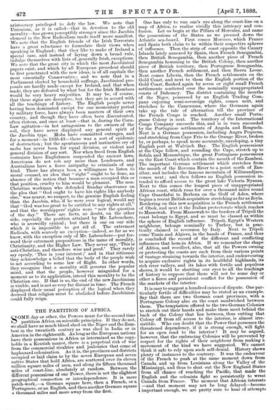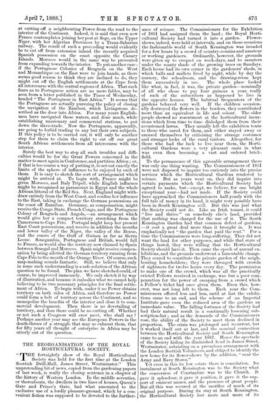THE PARTITION OF AFRICA.
SOME day or other, the Powers must for the second time partition Africa on scientific principles. If they do not, we shall have as much blood shed on the Niger and the Zam- besi in the twentieth century as was shed in India or in America in the eighteenth. As long as the European nations have their possessions in Africa as intermixed as the copy- holds in a Kentish manor, there is a perpetual risk of war from the commercial rivalries and jealousies that come of haphazard colonisation. As it is, the provinces and districts occupied or laid claim to by the seven European and seven native States that hold Africa, are scattered over its eleven million square miles of area, and along its fifteen thousand miles of coast-line, absolutely at random. Between the different poeseesione of one Power, there is not the slightest geographical connection or interdependence. It is mere patch-work,—a German square here, then a French, or a Portuguese, or an English, and then another German square a, thousand miles and more away from the first. One has only to run one's eye along the coast-line on a map of Africa, to realise vividly this intricacy and con- fusion. Let us begin at the Pillars of Hercules, and name the possessions of the States as we proceed down the Atlantic sea-board. First comes Morocco, which France and Spain both claim to be within their respective spheres of influence. Then the strip of coast opposite the Canary Islands lately annexed by Spain, then French Senegambia, then British Senegambia, then another piece of French Senegambia hemming in the British Colony, then another piece of British territory, then Portuguese Senegambia, then another French settlement, and then Sierra Leone.
Next comes Liberia, then the French settlements on the Gold Coast, and next to them the English portion of the Gold Coast, flanked again by seven or eight small French settlements scattered over the nominally unappropriated coasts of Dahomey. The district containing the mouths of the Niger, possessed by an English Trading Com- pany enjoying semi-sovereign rights, comes next, and stretches to the Cameroons, where the Germans again take up the tale of alternation till the province of the French Congo is reached. Another small Portu- guese Colony is next. The territory of the International Congo Company succeeds this, and is in turn succeeded by the Portuguese settlements of Angola and Benguela. Next is a German possession, including Angra, Pequena, and stretching from Cape Frio to the Orange River, broken by, or perhaps, to speak more accurately, enveloping, a tiny English port at Walvisch Bay. The English possessions at the Cape follow, and rounding the Cape, stretch up to Sofala and Mozambique, the great Portuguese possessions on the East Coast which contain the mouth of the Zambesi.
The important German settlement which stretches from the mouth of the Rovuma River to a point north of Zan- zibar, and includes the famous mountain of Kilimandjaro, comes next ; and then follows an English possession in- tended to afford access to the great lake Victoria Nyanza. Next to this comes the longest piece of unappropriated African coast, which runs for over a thousand miles round Cape Guardafui to Berbera on the Gulf of Aden, where begins a recent British acquisition stretching as far as Zeyla,. Bordering on this new acquisition is the French settlement of Obok, and next it the Italian protectorate which reaches to Massowah. From Massowah to the borders of Tripoli the coast belongs to Egypt, and so must be classed as within the sphere of English influence. Tripoli, Egypt's Western neighbour, belongs nominally to Turkey, but is prac- tically claimed in reversion by Italy. Next to Tripoli come Tunis and Algiers, in the hands of France, and thus is concluded the record of the different and conflicting influences that hem-in Africa. If we remember the shape of Africa, and recollect, also, that all the Powers owning or protecting the coasts are each from their various points of vantage straining towards the interior, and endeavouring to acquire exclusive rights in its healthful highlands, its rich river valleys, and its lakes with fertile and populous shores, it would be shutting our eyes to all the teachings of history to suppose that there will not be some day or other a fierce and persistent conflict for the possession of the markets of the interior.
It is easy to suggest a hundred causes of dispute. One par- ticularly fertile of difficulties may be stated as an example. Say that there are two German coast provinces, with a Portuguese Colony also on the coast sandwiched between them. The temptation offered to the two German Colonies to stretch out their hands and make them meet behind the back of the Colony that lies between, thus cutting that Colony off from all access to the interior, is almost irre- sistible. Who can doubt that the Power that possesses the threatened dependency, if it is strong enough, will fight for an open road to the interior ? It may be argued, however, that the embracing Colonies will be prevented by respect for the rights of their neighbour from making a movement of the kind we have suggested. We cannot think it safe to rely upon such self-denial. History shows plenty of instances to the contrary. It was the endeavour of the French to push at the same moment down from Canada and up from Louisiana along the Valley of the Mississippi, and thus to shut out the New England States from all chance of reaching the Pacific, that made the English and the colonists fight so persistently to wrest Canada from France. The moment that African interests —and that moment may not be long delayed—become important enough, we are pretty sure to hear of attempts at cutting off a neighbouring Power from the road to the interior of the Continent. Indeed, it is said that even now France contemplates joining her post at Sego, on the Upper Niger, with her Algerian Provinces by a Trans-Saharian railway. The result of such a proceeding would evidently be to cut off from extension inland the recently acquired Spanish possession on the coast opposite the Canary Islands. Morocco would in the same way be prevented from expanding towards the interior. To put another case : if the Portuguese Colonies of Benguela on the West and Mozambique on the East were to join hands, as there seems good reason to think they are inclined to do, they might cut off the English settlements at the Cape from all intercourse with the central regions of Africa. That such fears as to Portuguese action are no mere fables, may be seen from a letter published in the Times of Wednesday, headed "The Portuguese in East Africa." It seems that the Portuguese are actually pursuing the policy of closing the navigation of the Zambesi, which Livingstone de- scribed as the door into Africa. For many years English- men have navigated these waters, and done much, while establishing missionary and commercial stations, to put down the slave-trade. Now the Portuguese, apparently, are going to forbid trading to any but their own subjects. If this policy is to be carried out, it will only be another step for them to claim the right to cut off our great South African settlements from all intercourse with the interior.
Surely the best way to stop all such troubles and diffi- culties would be for the Great Powers concerned in the matter to meet again in Conference, and partition Africa ; or, if that is too coarse a way of putting it, to set out exactly the limits of the sphere of influence to be enjoyed by each of them. It is easy to sketch the sort of arrangement which might be arrived at. To begin with, France might be given Morocco, and Italy Tripoli, while English influence might be recognised as paramount in Egypt and the whole African littoral of the Red Sea. Next, England might with- draw entirely from the West Coast, and confine her influence to the East, taking in exchange the German possessions on the coast off Zanzibar. Germany, as compensation, might receive the Congo State, French Congo, and the Portuguese Colony of Benguela and Angola,—an arrangement which would give her a compact territory stretching from the Cameroons to Cape Frio. Portugal might keep her present East Coast possessions, and receive in addition the mouths and lower valley of the Niger, the valley of the Benue, and the coasts of the Gulf of Guinea as far as Sierra Leone. Senegambia; Portuguese and British, would fall to France, as would also the territory now claimed by Spain between Senegal and Morocco. Spain might receive compen- sation by being allotted the German territory nirming from Cape Frio to the mouth of the Orange River. Of course, such map-making sounds fantastic. Still, we believe that only in some such understanding is a safe solution of the African question to be found. The plan we have sketched could, of course, be improved immensely. We only sketch it by way of illustration, and because it embodies what we cannot help believing to be two necessary principles for the final settle- ment of Africa. To begin with, under it no Power obtains territory on both sides of Africa, and therefore no Power could form a. belt of territory across the Continent, and so monopolise the benefits of the interior and close it to com- mercial development. Then there is no dovetailing of territory, and thus there could be no cutting off. Whether or not such a Congress will ever meet, who shall say ? Perhaps another year may see the European Powers in the death-throes of a struggle that may so exhaust them, that for fifty years all thought of enterprise in Africa may be utterly out of the question.



































 Previous page
Previous page